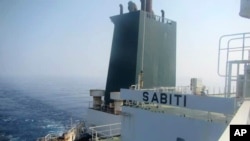Images of an Iranian tanker burning off the Red Sea coast of Saudi Arabia caused oil prices to jump 2% Friday, after Iran's national oil tanker company claimed that one of its ships was hit by several missiles near the port of Jeddah.
The explosion and fire took place as Pakistani Prime Minister Imran Khan was preparing to meet Saturday in Tehran with Iranian President Hassan Rouhani. Khan is reportedly carrying a message from Saudi Crown Prince Mohammed bin Salman.
Iran's Press TV reported that a government-owned oil tanker, the Sabiti, caught fire after several missiles allegedly hit the ship 100 kilometers off the Saudi Red Sea Port of Jeddah. The TV channel said Iran's national oil tanker company indicated the fire was put out quickly and that all crew members were safe.
The Iranian Student News Agency ISNA showed pictures of the burning ship, reporting that it was hit by two explosions shortly after 5 a.m. Friday. The agency added that company experts think two missiles hit the ship.
Qatar's al-Jazeera TV reported that the explosions took place one day before Pakistani Prime Minister Imran Khan was to meet in Tehran with President Hassan Rouhani. Iranian government spokesman Ali Rabiei said Khan was bringing a message from Saudi Crown Prince Mohammed bin Salman. It was not clear what the alleged message contained.
Saudi Minister of State for Foreign Affairs Adel Jubeir recently denied media reports of behind-the-scenes efforts to mediate between Riyadh and Tehran, but noted that Saudi Arabia told Iran that "[its] position has always been to seek security and stability in the region."
Hilal Khashan, who teaches political science at the American University of Beirut, tells VOA that some Arab media outlets are claiming that Israel may have been behind the attack.
"It wouldn't surprise me if the Israelis were behind (the alleged attack) in order to sabotage the likelihood of a detente or entente or any sort of understanding between the Iranians and the Saudis."
He added that it is also possible that the Saudis themselves "may have wanted to settle some scores with the Iranians and hit the ship (either directly or using proxies)." If the Saudis were involved in the attack, he argues, "it would be counter-productive and represent political stupidity."
Khashan also noted that he is not extremely optimistic about any long-term rapprochement between Tehran and Riyadh, due to "a deep cultural and ideological gap between Arabs and the Iranians, which goes back to the early days of Islam."
"Even if an understanding takes place between the Iranians and the Saudis, it will be temporary. The two countries are completely incapable of having long-term peace."
Saudi Arabia and Iran have been fighting each other via proxy forces in various regional countries, including Syria, Iraq and Yemen. Yemen's Iranian-backed Houthis claimed that they were responsible for recent missile and drone attacks on Saudi oil installations which disrupted around 5% of world oil supplies. Riyadh accused Iran of launching the attacks from its own soil, which Tehran denied.







